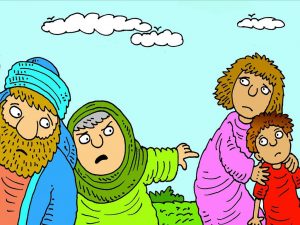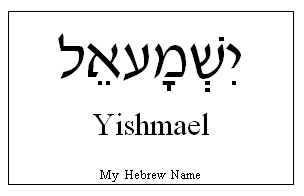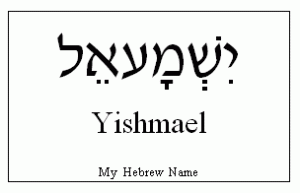When laughing is bad:
Growing up we were taught that Yishmoel was a very bad guy. Who told us that? The heylige Toirah? Zicher not! In fact, the heylige Toirah does not say one bad word about him. One could argue that it’s punkt farkert (the opposite is true). Oib azoy (if that is the case and seemingly maybe it was, the first kasha we ask is this: who told us he was bad and why? And is what they told us about him at all emes? Was he perhaps a good guy?
Shoin, before we answer those questions and a few more that will pop into my head as these words are being reduced to the computer screen, let us begin with this. In the past two weeks we have been shining a shtikel light on secondary Toirah characters. Two weeks ago, we featured Lemach and last week we followed the adventures of Oig. This week, we shall explore the bad hand dealt to Yishmoel, he the firstborn son of Avrohom Ovenu who fathered him when he “came to” the shiksa maidservant working for Avrohom and Soro. Yes indeed raboyseyee, that’s how it went down. Unable to conceive, it was mamish Soro’s idea for her own husband, the father of all Yiddin (not yet then) to have not just a sexual encounter, but a shtikel relationship with the shiksa housekeeper. He married her as well. Avrohom was efsher the first husband to come upon the housekeeper but zicher not the last. The bottom line: do not try this at home! Do not, if chapped coming to the housekeeper, try telling the eishes chayil that you were but emulating the ways of your forefather Avrohom. It won’t work.
Ober to chap why Rashi and medrish took license and decided to paint Yishmoel with the “bad actor” label, let’s find out what drove them. To do that we harken back to last week’s parsha where a barren Soro said azoy to Avrohom. Let’s read Perek 16: pisukim 1-4 innaveynig.
| 1. Now Sarai, Abram’s wife, had not borne to him, and she had an Egyptian handmaid named Hagar. | אוְשָׂרַי֙ אֵ֣שֶׁת אַבְרָ֔ם לֹ֥א יָֽלְדָ֖ה ל֑וֹ וְלָ֛הּ שִׁפְחָ֥ה מִצְרִ֖ית וּשְׁמָ֥הּ הָגָֽר: | |
| 2. And Sarai said to Abram, “Behold now, the Lord has restrained me from bearing; please come to my handmaid; perhaps I will be built up from her.” And Abram hearkened to Sarai’s voice. | בוַתֹּ֨אמֶר שָׂרַ֜י אֶל־אַבְרָ֗ם הִנֵּה־נָ֞א עֲצָרַ֤נִי יְהֹוָה֙ מִלֶּ֔דֶת בֹּא־נָא֙ אֶל־שִׁפְחָתִ֔י אוּלַ֥י אִבָּנֶ֖ה מִמֶּ֑נָּה וַיִּשְׁמַ֥ע אַבְרָ֖ם לְק֥וֹל שָׂרָֽי: | |
| 3. So Sarai, Abram’s wife, took Hagar the Egyptian, her handmaid, at the end of ten years of Abram’s dwelling in the land of Canaan, and she gave her to Abram her husband for a wife. | גוַתִּקַּ֞ח שָׂרַ֣י אֵֽשֶׁת־אַבְרָ֗ם אֶת־הָגָ֤ר הַמִּצְרִית֙ שִׁפְחָתָ֔הּ מִקֵּץ֙ עֶ֣שֶׂר שָׁנִ֔ים לְשֶׁ֥בֶת אַבְרָ֖ם בְּאֶ֣רֶץ כְּנָ֑עַן וַתִּתֵּ֥ן אֹתָ֛הּ לְאַבְרָ֥ם אִישָׁ֖הּ ל֥וֹ לְאִשָּֽׁה: | |
| 4. And he came to Hagar, and she conceived, and she saw that she was pregnant, and her mistress became unimportant in her eyes. | דוַיָּבֹ֥א אֶל־הָגָ֖ר וַתַּ֑הַר וַתֵּ֨רֶא֙ כִּ֣י הָרָ֔תָה וַתֵּקַ֥ל גְּבִרְתָּ֖הּ בְּעֵינֶֽיהָ: |
The bottom line: while fertility clinics are filled with young and even older Jewish girls and wives trying to conceive, shiksas-much to the consternation of their drive-by boyfriends and lovers- seemingly get pregnant kimat instantly. Why? Ver veyst? Avrohom came upon Hogor and shoin. All was good in the Avrohom and Soro household for a short while. Ober Soro had shiksa-remorse and pushed a still pregnant Hogor out of the house where she was confronted by a Malach Hashem (an angel) who told her azoy (Bereishis 16:12):
| And he will be a wild donkey of a man; his hand will be upon all, and everyone’s hand upon him, and before all his brothers he will dwell.” | יב וְה֤וּא יִֽהְיֶה֙ פֶּ֣רֶא אָדָ֔ם יָד֣וֹ בַכֹּ֔ל וְיַ֥ד כֹּ֖ל בּ֑וֹ וְעַל־פְּנֵ֥י כָל־אֶחָ֖יו יִשְׁכֹּֽן: |
OMG: the RBSO’s angel tells Hogor not to worry; the RBSO has his back. Yishmoel was destined for greatness. Hogor returned for more Soro abuse. Ober, along came Rashi at this point and told us that the malach’s prediction and blessing was not quite as flattering as we had thought and there is deeper meaning in the angel’s words. Says Rashi quoting the medrish (Tanchuma Shmois 1) that the words “his hands will be in everything” are meant to tell us that he will become a bandit. A bad guy. The heylige Toirah goes out of its way to mention that Avrohom was 86 years old when Yishmoel was born. We should remember this key number as question below are based on this number.
Let’s skip ahead 13 years. Avrohom is now 99 years old and the RBSO instructs him to undergo a bris ceremony. Seemingly Avrohom’s foreskin was also efsher an impediment to his ability to father a child with Soro. Our central figure of interest gets several named Toirah shout outs in last week’s parsha and we share this information in order to lay a foundation for the questions we and you may have. And let’s also keep this in mind. If Avrohom is now 99 years old, Yishmoel is now 13 years old. The RBSO says this about Yishmoel in 17:20:
| And regarding Ishmael, I have heard you; behold I have blessed him, and I will make him fruitful, and I will multiply him exceedingly; he will beget twelve princes, and I will make him into a great nation. | כוּלְיִשְׁמָעֵאל֘ שְׁמַעְתִּ֒יךָ֒ הִנֵּ֣ה | בֵּרַ֣כְתִּי אֹת֗וֹ וְהִפְרֵיתִ֥י אֹת֛וֹ וְהִרְבֵּיתִ֥י אֹת֖וֹ בִּמְאֹ֣ד מְאֹ֑ד שְׁנֵֽים־עָשָׂ֤ר נְשִׂיאִם֙ יוֹלִ֔יד וּנְתַתִּ֖יו לְג֥וֹי גָּדֽוֹל: |
What do we read? The RBSO blesses Yishmoel and tells Avrohom that Yishmoel is destined and is especially blessed, and that the RBSO will make sure that he’s fruitful, that his size will be increased exceedingly, and he will beget 12 Princes. The RBSO will make him into a great nation. These are not shabby promises from the RBSO about Yishmoel. How bad can Yishmoel be? Does the RBSO typically reward bad actors?
Has the Toirah to this point mentioned one bad word about Yishmoel? Not! At this point in time, the RBSO sees only good in Yishmoel. In fact, he’s a great son. And as last week’s parsha was closing out, we learned these stats: Avrohom was 99 years old when he performed a bris on Yishmoel and that Yishmoel was 13 years old at the time. Let’s remember that date as well. The bottom line: for his bar mitzvah, instead of getting gifts to include savings bonds, cufflinks, kiddish cups, even seforim, and also feeling good about himself, he was instead cut down to size. Again, to this point not one bad word about Yishmoel. The RBSO loves him and so does Avrohom.
Welcome to Parshas Vayero where the imagination of our sages ran wild about Yishmoel’s personality and behavior. They badmouth him terribly and tore him a new tuchis-hole. We are about to read all about it and let’s set the scene. Halt kup (pay close attention). A newly circumcised Avrohom gets Soro (previously barren) pregnant and at 100 years of age, he becomes a father again to his child born to Soro and names the boy Yitzchok. So far so good. Yishmoel is now all of 14 years old.
 Ober, just like that with one word in one posik, and one posik later, Yishmoel’s life is about to get turned upside down. What happened? What did Yishmoel do or say that changed everything? What did Soro do? Did the RBSO agree with her actions? What grave sin did Yishmoel commit? How old was Yishmoel when all this went down? Was he but a baby? Or was he teen? The heylige Toirah leads us to believe that Yishmoel was but a young child. It does? Let’s dig further.
Ober, just like that with one word in one posik, and one posik later, Yishmoel’s life is about to get turned upside down. What happened? What did Yishmoel do or say that changed everything? What did Soro do? Did the RBSO agree with her actions? What grave sin did Yishmoel commit? How old was Yishmoel when all this went down? Was he but a baby? Or was he teen? The heylige Toirah leads us to believe that Yishmoel was but a young child. It does? Let’s dig further.
Soro demands that Avrohom expel Hogor and her son Yishmoel out of the tent she shared with her husband. She had seemingly become convinced that this Yishmoel was epes a very bad child, but why? He was now a bad actor? That he deserved what he was about to get? So bad was Yishmoel that even his name was to become taboo; do you know even one person with that name? Moreover, do we not read in Proverbs (10:7), “The name of the wicked should rot [and not be remembered].” We do! And does not the heylige Gemora (Yoma 38b) interpret this to mean that one should not give a child the same name as a rosho, a wicked person? We do! And does not Rabaynu Chnanale teach us that bearing the same name as a wicked person can adversely affect the child’s character? He does! What’s pshat?
 And before we attempt to find answers to a few of these questions, let us also consider that mamish daily in our davening we mention a Rebbe Yishmoel who seems to have given us the famous 13 hermeneutic principles that drive all Jewish logic. What are those you ask? Oy vey! Do you know nothing? Check out your siddur – no matter what nusach you daven-one can find the profound thoughts of Rebbe Yishmoel. And the question is azoy: if taka Yishmoel who went on to become the father of all Arabs and Arab nations (confirmed by Maury Povich of course), and if these people have been our sworn enemies for generations, how was it that a nice Jewish mother gave the name Yishmoel to her son? And how did this Rebbe Yishmoel go about life with that name? Moreover, don’t we have a custom not to name a child after a wicked person? Do we know anyone by the name of Homon or Eisav? Was Yishmoel really a bad actor? Should we look at him differently?
And before we attempt to find answers to a few of these questions, let us also consider that mamish daily in our davening we mention a Rebbe Yishmoel who seems to have given us the famous 13 hermeneutic principles that drive all Jewish logic. What are those you ask? Oy vey! Do you know nothing? Check out your siddur – no matter what nusach you daven-one can find the profound thoughts of Rebbe Yishmoel. And the question is azoy: if taka Yishmoel who went on to become the father of all Arabs and Arab nations (confirmed by Maury Povich of course), and if these people have been our sworn enemies for generations, how was it that a nice Jewish mother gave the name Yishmoel to her son? And how did this Rebbe Yishmoel go about life with that name? Moreover, don’t we have a custom not to name a child after a wicked person? Do we know anyone by the name of Homon or Eisav? Was Yishmoel really a bad actor? Should we look at him differently?
Shoin, what was that one word and posik that changed his life and gave the medrish license to so vilify him? Says the heylige Toirah (Bereishis 21:9) azoy:
| And Sarah saw the son of Hagar the Egyptian, whom she had borne to Abraham, making merry. | טוַתֵּ֨רֶא שָׂרָ֜ה אֶת־בֶּן־הָגָ֧ר הַמִּצְרִ֛ית אֲשֶׁר־יָֽלְדָ֥ה לְאַבְרָהָ֖ם מְצַחֵֽק: |
You hear that? He was being “mitzachake” or laughing. Or making merry? Is that bad? Isn’t making merry good? Doesn’t Santa do that? Rabbi Art Scroll translates the word as ‘mocking.’ Shoin from that one word and action, Soro decided to permanently banish him from the household and so ordered her compliant husband to take action. Now let us assume that mocking was taka a terrible sin, ober how old was Yishmoel at the time? Was he a teenager of at least 14 years old by now? Let’s recall that Avrohom was 86 when he was born and had another son at 100. That makes Yishmoel all of 14.Ober, we ask azoy: the heylige Toirah goes on to describe that he was but a “yeled,” a boy, or a child. He was? Says the heylige Toirah (Bereshis 21:14- 17) azoy:
| 14. And Abraham arose early in the morning, and he took bread and a leather pouch of water, and he gave [them] to Hagar, he placed [them] on her shoulder, and the child, and he sent her away; and she went and wandered in the desert of Beer Sheba. | ידוַיַּשְׁכֵּ֣ם אַבְרָהָ֣ם | בַּבֹּ֡קֶר וַיִּקַּח־לֶ֩חֶם֩ וְחֵ֨מַת מַ֜יִם וַיִּתֵּ֣ן אֶל־הָ֠גָ֠ר שָׂ֧ם עַל־שִׁכְמָ֛הּ וְאֶת־הַיֶּ֖לֶד וַיְשַׁלְּחֶ֑הָ וַתֵּ֣לֶךְ וַתֵּ֔תַע בְּמִדְבַּ֖ר בְּאֵ֥ר שָֽׁבַע: | |
| 15. And the water was depleted from the leather pouch, and she cast the child under one of the bushes. | טווַיִּכְל֥וּ הַמַּ֖יִם מִן־הַחֵ֑מֶת וַתַּשְׁלֵ֣ךְ אֶת־הַיֶּ֔לֶד תַּ֖חַת אַחַ֥ד הַשִּׂיחִֽם: | |
| 16. And she went and sat down from afar, at about the distance of two bowshots, for she said, “Let me not see the child’s death.” And she sat from afar, and she raised her voice and wept. | טזוַתֵּ֩לֶךְ֩ וַתֵּ֨שֶׁב לָ֜הּ מִנֶּ֗גֶד הַרְחֵק֙ כִּמְטַֽחֲוֵ֣י קֶ֔שֶׁת כִּ֣י אָֽמְרָ֔ה אַל־אֶרְאֶ֖ה בְּמ֣וֹת הַיָּ֑לֶד וַתֵּ֣שֶׁב מִנֶּ֔גֶד וַתִּשָּׂ֥א אֶת־קֹלָ֖הּ וַתֵּֽבְךְּ: | |
| 17. And G-d heard the lad’s voice, and an angel of G-d called to Hagar from heaven, and said to her, “What is troubling you, Hagar? Fear not, for G-d has heard the lad’s voice in the place where he is. | יזוַיִּשְׁמַ֣ע אֱלֹהִים֘ אֶת־ק֣וֹל הַנַּ֒עַר֒ וַיִּקְרָא֩ מַלְאַ֨ךְ אֱלֹהִ֤ים | אֶל־הָגָר֙ מִן־הַשָּׁמַ֔יִם וַיֹּ֥אמֶר לָ֖הּ מַה־לָּ֣ךְ הָגָ֑ר אַל־תִּ֣ירְאִ֔י כִּֽי־שָׁמַ֧ע אֱלֹהִ֛ים אֶל־ק֥וֹל הַנַּ֖עַר בַּֽאֲשֶׁ֥ר הוּא־שָֽׁם: |
When the water ran out, she placed the “yeled” down and placed herself some distance away for she did not want to see her child die from thirst. And we ask azoy: based on these pisukim where he is referred to as a ”yeled” several times and where his mother sets him down some distance away not to witness his death from a lack of water or food, was this very young boy really bad when he either laughed, made merry, or even mocked? He was but a child! Does the Toirah ever use the word yeled to connote a teen? Does a mother carry a 14 or 16-year-old? Does a mother place a 14 or 16-year-old down under a tree and leave him there thinking that he won’t just get up and rejoin her? I think not! And he if was a child, what sin did he commit to have been kicked out and so vilified by our sages? And if he wasn’t a child, he was certainly not more than 16 years of age? Why 16? Because the Toirah also tells us but one posik before the expulsion that Avrohom made a party for Yitzchok when he was weaned and Rashi quoting the medrish (Medrish Rabbah 53:10) tells us that the party took place after he was weaned, meaning after he naturally rejected his mother’s breast milk. When does that happen? Says the medrish: this takes place at 24 months of age. Sidebar: seemingly the desire for breasts kicks back in for life in the teenage years. The bottom line: Yishmoel was either a “yeled” at the time of his offense, or he was not more that 16 years of age. The bottom line: from the words of the heylige Toirah, it does appear that Yishmoel was but a child.
 On the other hand, from other words of the heylige Toirah, we are led to believe that he was 14 or 16. How old was he? Ver Veyst? I have seen it suggested that perhaps he was older but that he was a very small child, efsher even sickly, efsher with special needs, and that’s why Hogor was able to carry him and able to place him down without him getting back up to rejoin her. Is that what happened, ver veyst? And we ask again, was his crime so giferlich at either age that medrish paints him as being a wicked man?
On the other hand, from other words of the heylige Toirah, we are led to believe that he was 14 or 16. How old was he? Ver Veyst? I have seen it suggested that perhaps he was older but that he was a very small child, efsher even sickly, efsher with special needs, and that’s why Hogor was able to carry him and able to place him down without him getting back up to rejoin her. Is that what happened, ver veyst? And we ask again, was his crime so giferlich at either age that medrish paints him as being a wicked man?
Moreover, did not the RBSO -in this very matter- utter the Oisvorfer’s favorite three words in the entire heylige Toirah, the words “ba’sher hu shom” (as he is today)? He did! Let’s read them again:
| And G-d heard the lad’s voice, and an angel of G-d called to Hagar from heaven, and said to her, “What is troubling you, Hagar? Fear not, for G-d has heard the lad’s voice in the place where he is. | יזוַיִּשְׁמַ֣ע אֱלֹהִים֘ אֶת־ק֣וֹל הַנַּ֒עַר֒ וַיִּקְרָא֩ מַלְאַ֨ךְ אֱלֹהִ֤ים | אֶל־הָגָר֙ מִן־הַשָּׁמַ֔יִם וַיֹּ֥אמֶר לָ֖הּ מַה־לָּ֣ךְ הָגָ֑ר אַל־תִּ֣ירְאִ֔י כִּֽי־שָׁמַ֧ע אֱלֹהִ֛ים אֶל־ק֥וֹל הַנַּ֖עַר בַּֽאֲשֶׁ֥ר הוּא־שָֽׁם: |
Did not the RBSO instruct the angel to go down and save Yishmoel because he was to be judged as he is today and not on what he might turn out to be in the future? He did! And if all that is emes and it zicher is so because those are the words of the RBSO – to go save the child- why then did our sages take liberties with their less than flattering descriptions of Yishmoel when we read that he was expelled along with his mother? Any answers? Did the RBSO take a special interest in Yishmoel davka because he was efsher small, sickly, or with special needs? Could be!
 On the other hand, did not the RBSO tell Avrohom to listen to all that his wife Soro said? He did! What’s pshat? Was Yishmoel good or bad? Or efsher both? And that raboyseyee might be the key to the medrish: seemingly if the RBSO ordered Avrohom to listen to all his wife said and act accordingly, medrish took these words to mean that Yishmoel was bad. If the RBSO allowed him to be expelled, he was -in their eyes- bad. How bad? Let’s read how they painted him.
On the other hand, did not the RBSO tell Avrohom to listen to all that his wife Soro said? He did! What’s pshat? Was Yishmoel good or bad? Or efsher both? And that raboyseyee might be the key to the medrish: seemingly if the RBSO ordered Avrohom to listen to all his wife said and act accordingly, medrish took these words to mean that Yishmoel was bad. If the RBSO allowed him to be expelled, he was -in their eyes- bad. How bad? Let’s read how they painted him.
Let’s begin with Rashi who gives us a smorgasbord of choices on Yishmoel’s bad behavior when mocking. Say Rashi that the word mocking connotes idolatry. You hear this? Yishmoel -either the child or teen- was an idolater. Shoin! Alternatively, it connotes sexual immorality. More: it connotes murder. Yishmoel, as a child or teen was a murderer? Say it’s not so. Another pshat: Yishmoel was a murderer because he would argue and fight with Yitzchok (all of 2 years old at this time) about potential inheritance coming their way upon the death of their father. Says the Medrish (Medrish Rabbah 53:11) that Yishmoel and Yitzchok would go to the field where Yishmoel would shoot arrows towards Yitzchok while insisting they were merely in jest (from the word mitzachake). Shoin, there you have a list of Yishmoel’s sins. Were all allegations emes? Ver veyst?
The bottom line: the heylige Toirah, as mentioned above, says nothing bad about him. The RBSO made sure to save him and told his mother that Yishmoel was destined for greatness. Another bottom line: why, if painted as a bad man, were great rabbis named after him? Was he bad or good? We can speculate azoy: either their mothers did not believe that Yishmoel was taka bad (how bad could he have been as a “yeled” or even teenager)? How much idolatry could he have practiced at those ages? Or, their mothers heard that later in life Yishmoel did tshuva, he became a penitent. Do all agree that taka he did tshuva? Of course not! Ersthens we should know that there have been a number of righteous people named Yishmoel, including the one found in all our siddurim who was in fact a leading sage in the times of the Mishneh and a colleague of Rebbe Akiva. Let’s also shout out the famously righteous koihen godol (High Priest) during the Second Temple era, who was one of the 10 martyrs killed by the Romans. Others suggest that it’s taka emes that we don’t name after bad guys, ober that’s only emes if the bad guy died without repenting. Yishmoel, as mentioned above, was a ba’al tshuva. Shoin! According to some opinions in the heylige Gemora (Buba Basra 16b, and the medrish in Vayikra Rabah 26:7, although Yishmoel had his ups and downs, ultimately, he repented and was considered righteous. Shoin, the injunction against naming after the wicked would not apply to him.
 Oib azoy, why don’t we know anyone with that name? Is it because not all sources agree that Yishmoel repented before he died? They don’t all agree? What a surprise! Says who that he never repented? Check out the heylige Gemora (Sanhedrin 104a; the Ritva ( Yoma 38b) and the Responsum of the Chasam Soifer. Ober, according to them, why are there righteous Jews in our history who bore his name? Shoin, let’s try another approach:
Oib azoy, why don’t we know anyone with that name? Is it because not all sources agree that Yishmoel repented before he died? They don’t all agree? What a surprise! Says who that he never repented? Check out the heylige Gemora (Sanhedrin 104a; the Ritva ( Yoma 38b) and the Responsum of the Chasam Soifer. Ober, according to them, why are there righteous Jews in our history who bore his name? Shoin, let’s try another approach:
Efsher their mothers knew that Yishmoel had the rare distinction of having a name that was chosen by the RBSO Himself. Let’s recall these words: “The angel of the L‑rd said to [Hogor, concubine of Avrohom, ‘Behold, you will conceive and bear a son, and you shall name him Yishmoel, for the L‑rd has heard your affliction.’ ” The commentaries (Toisfis Yeshanim and the Ritva (Yoma 38b)) explain that since the name was chosen by the RBSO Himself, the injunction against naming after the wicked does not apply. After all, the name yishma-el means “G‑d [should] hear,” which has a most beautiful and spiritual connotation. The bottom line: Yishmoel -according to some- may have been bad till the end, ober since the RBSO named him, it’s permissible for mothers to use the name. Grada, there were a few Lubabitcher rebbes who had that very name and as a Chabad fan, kudos to their mothers.
The bottom line: if the name was good enough for the RBSO, it should have been, and should still be good enough for mothers of today.
A gittin Shabbis-
The Heylige Oisvorfer Ruv
Yitz Grossman

